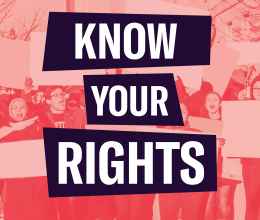Discussions of sexual orientation and gender identity are appropriate topics for middle school students, and schools should not limit such discussions in the lunchroom or hallways, or during time when students are not receiving instruction. This is the central point of a letter from the American Civil Liberties Union of Illinois to the leaders of Germantown Hills Middle School.
School officials recently authored a letter to parents of students at the middle school, noting that some students have been discussing issues surround sexual orientation, and suggesting that students would need permission in order to discuss such matters. The school district’s letter further claimed that “students do not have the right to dictate when and where they will discuss their sexual orientation or identity.” The ACLU argues that such a limitation on student discussion of these issues is a violation of the First Amendment and state non-discrimination laws.
The ACLU letter applauds the school’s commitment to a learning environment free from harassment and bullying, but at the same time suggests that public expressions of sexual orientation and gender identity are not too “disruptive” for school. In part, the ACLU writes:
“We commend your commitment to every student’s right to obtain an education without having to endure bullying or harassment. Unfortunately, the approach reflected in your letter undermines that goal. The letter suggests that sexual orientation or gender identity are not suitable topics to discuss publicly with one’s friends and peers, that it is inappropriate to express pride in one’s identity using symbols like rainbow heart stickers, and that students who wish to talk about such matters should do so in private, with a trusted adult. Even if not intended, the message to LGBTQ students is that they should be ashamed of and keep secret their identity. Their peers receive the same message.”
The ACLU also warned the school that limiting student discussions on sexual orientation is unconstitutional unless the resulting disruption is “substantial.” That standard is not met merely because other students react inappropriately to the speech. The ACLU observes that such a response points to a need for more education about these issues. The earlier school letter described the administration’s barring the distribution of rainbow stickers by students in the building, an action the ACLU questioned as well.
Finally, the letter points out that school’s approach may limit discussion of LGBTQ issues, but not heterosexual, cisgender perspective. As the ACLU writes, students routinely talk about romantic interest in a fellow student, or whether or not to date a fellow student, but this is more likely to be perceived as a statement about one’s sexual orientation when the couple in question are the same sex. The First Amendment does not permit the government to suppress one perspective on a topic while allowing a different one, even if the disparate treatment is partly unconscious.
“Commendably, Germantown Hills school officials want to protect students from harassment and bullying,” said Rebecca Glenberg, senior staff counsel at the ACLU of Illinois and author of the letter. “But that cannot happen while the school is also telling students that there is something wrong about discussing sexual orientation.”
“This situation offers a teachable moment to learn how to ensure that each student’s voice and perspective is respected and heard.”
The school is set to hold a town hall meeting on the matter this evening, which officials say will be open only to members of the school community, not the general public.




